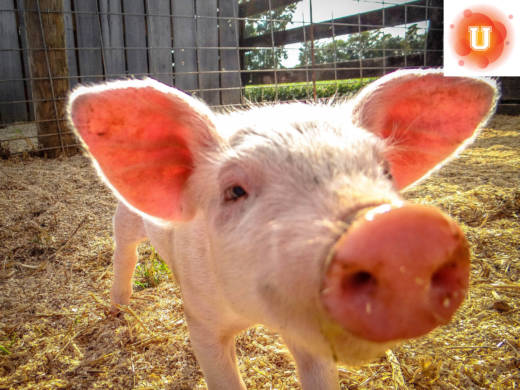You can also record a video response on Flipgrid. (Learn how to use Flipgrid here.)
Learn More About Growing Human Organs in Pigs
Recently, research has begun into the use of pigs to grow human organs. This is done in two stages. The first stage uses a technique known as CRISPR gene editing, which removes the gene necessary to grow a specific organ in a pig embryo. In stage two, human stem cells (which are capable of developing the respective human organ) are injected into the pig embryo. The embryo is then implanted into a sow. The idea is that the human organ would grow inside the embryo. If this research is successful, it would mean that human organs could be grown inside of live pigs for future harvest and organ donation. This research could lead to an increase in the accessibility of organs required for transplant. However, there is also quite a bit of controversy surrounding the ethics of using pigs as biological incubators for human organs.
There are multiple reasons why people support the idea of growing human organs in pigs. According to the American Transplant Foundation, 22 people die everyday waiting for organ donations. People could face a time period of anywhere from four months to five years waiting for a vital organ. During the wait, many people have to face a reduced quality of life due to worsening symptoms, while still others face death. Supporters of the research contend that it is worth the risks as long as human lives could be saved. Growing organs using pigs as biological incubators would make a greater number of organs more readily available for harvesting, therefore benefiting those waiting for vital organ donations. Using this method, there is the potential to grow human organs in a shorter time frame than occurs in humans, due to the shorter gestational period of pigs. Another benefit would be the possibility for customization. With current methods of transplantation, after patients receive a donated organ, they spend the rest of their lives taking immune suppressing drugs so that their bodies won’t reject the organ. This new research method, however, could use stem cells from the future organ recipient in the pig embryo, which could create an organ that would be a better match than what is achievable with traditional transplant methods. The research into this field of possibilities is promising, however it is still a ways off from becoming reality.
There are technical and ethical reasons why people may be opposed to growing human organs in pigs. One risk includes the possibility of the pig fetuses developing more human-like brains due to the stem cells inserted into the fetuses. Scientists conducting the research have aborted the embryos after three to four weeks, preventing the possibility of creating viable pigs with human-like traits. Even with the ability to customize organs using the recipient’s own cells, what if during the growth period the organ is somewhat altered because of the pig’s DNA? Additionally, there are ethical concerns to using pigs as biological incubators for human organs. These pigs would be bred for the sole purpose of growing organs before being killed to harvest the organs for donation. This model warrants the consideration of the biological incubator business growing into the next generation of factory farms. Additionally, if this new research leads to success in practice, some fear that this could eventually lead to growing human fetuses with the intent of harvesting their organs.
This new technique could be very beneficial to the thousands of people on organ transplant lists waiting for life-saving operations, but how ethical is this practice? What do you think? Should pigs be used as biological incubators to grow human organs?
More Resources
Article: National Geographic
Human-Pig Hybrid Created in the Lab—Here Are the Facts
Get more background information on the research surrounding human-pig hybrids/chimeras for growing human organs.
Video: Wellcome Trust
What Is Gene Editing and How Does It Work?
Learn the basics of the CRISPR gene-editing technique, and consider the pros and cons of this technology for many uses.
Notice: National Institutes of Health (NIH)
NIH Research Involving Introduction of Human Pluripotent Cells into Non-Human Vertebrate Animal Pre-Gastrulation Embryos
Read a notice from the NIH that states it will not currently fund research in which human stem cells are injected into non-human embryos.
Find best practices for using Do Now, using Twitter for teaching, and using other digital tools.
KQED Do Now U is a biweekly activity in collaboration with SENCER. SENCER is a community of transformation that consists of educators and administrators in the higher and informal education sectors. SENCER aims to create an intelligent, educated, and empowered citizenry through advancing knowledge in the STEM fields and beyond. SENCER courses show students the direct connections between subject content and the real world issues they care about, and invite students to use these connections to solve today’s most pressing problems.
